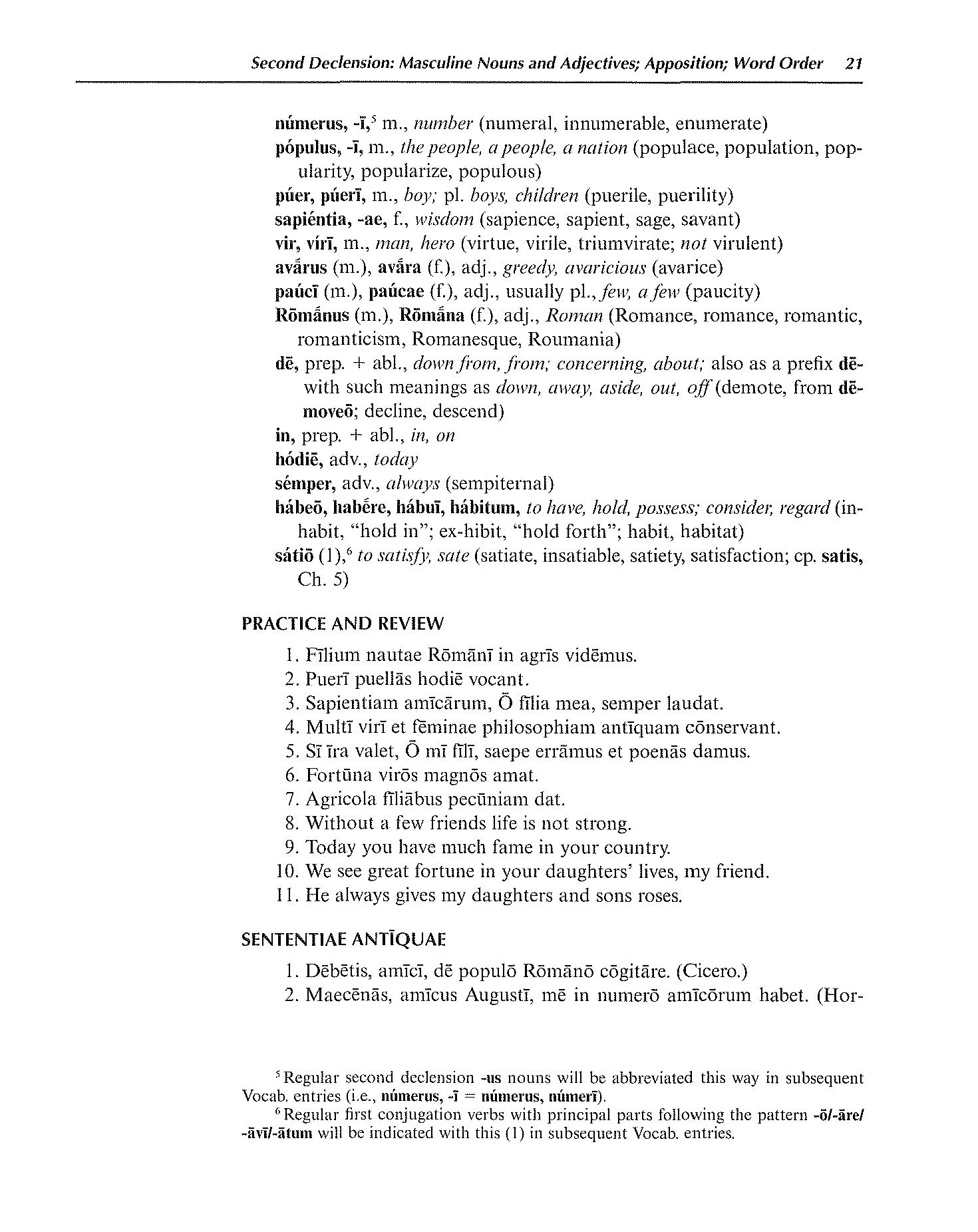
page_listing.tpl
page_subListingDetails.tpl
sub_listingDetails_style1.tpl
sub_listingDetails.title.tpl
sapientia wisdom
sapientia is a Latin Noun that primarily means wisdom.
Definitions for sapientia
Wheelock's Latin
Noun
- 1
wisdom
English derivatives:
sapience sapient sage savant
Oxford Latin Dictionary
Noun
- 1
Reason, soundness of mind.
- 2
Soundness of judgement or understanding, wisdom. (b) (personified).
- 3
Wisdom as the study and goal of philosophers. (b) wisdom as a Stoic virtue.
Sentences with sapientia
Latin to English
Cīvitātem magnā cum sapientiā gerēbant.Compare They were managing the state with great wisdom.
Decem virī satis sapientiae et multum virtūtis habuērunt.Compare The ten men had enough wisdom and much virtue.
Difficilem artem lībertātis dulcis nōn intellēxērunt, nam parvum sapientiae habuērunt.Compare They did not understand the difficult art of sweet liberty, for they had little wisdom.
Sapientia et vēritās in illīs duōbus hominibus nōn invenientur (inveniuntur, inventae sunt).Compare Wisdom and truth will not be found (are not found, were not found) in those two men.
Optimōs librōs tantā cum cūrā lēgērunt ut multum sapientiae discerent.Compare They read the best books with such great care that they learned much wisdom.
Vīsne habēre multum sapientiae? Studē Latīnae!Compare Do you wish to have much wisdom? Study Latin!
Rursus, quid virtus et quid sapientia possit, utile proposuit nobis exemplar Ulixen.Compare Again, of the power of virtue and wisdom he has given a profitable example in Ulysses.
Ad sapientiam pertinet aeternarum rerum cognitio intellectualis, as scientiam vero temporalium, rerum cognitio rationalis. [De Trinitate, XII, 15, 25]Compare To wisdom belongs the intellectual apprehension of things; to knowledge, the rational apprehension of things temporal.
Declension table for sapientia
Cactus2000
| Singular | Plural | |
| Nom. | sapientia | sapientiae |
| Gen. | sapientiae | sapientiārum |
| Dat. | sapientiae | sapientiīs |
| Acc. | sapientiam | sapientiās |
| Abl. | sapientiā | sapientiīs |
Data sources
Notes
- Definitions
- Frederick M. Wheelock, Wheelock's Latin, 6th ed., rev. Richard A. LaFleur (New York, NY: HarperCollins Publishers, 2005): 21.
- P. G. W. Glare, Oxford Latin Dictionary, Vols. 1-8 (Oxford: Clarendon Press, 1982): 1690.
- Word frequencies
- Christopher Francese, "Latin Core Vocabulary," Dickinson College Commentaries, last modified 2014, http://dcc.dickinson.edu.
- Paul B. Diederich, The Frequency of Latin Words and Their Endings, PhD diss., (Columbia University, 1939).
- Louis Delatte, Suzanne Govaerts, Joseph Denooz, and Etienne Evrard, Dictionnaire fréquentiel et index inverse de la langue latine [Frequency Dictionary and Inverse Index of the Latin Language] (Liège, Belgium: Laboratoire d'analyse statistique des langues anciennes de l'Université de Liège [L.A.S.L.A.], 1981): 123.
Bibliography
Allen, Joseph H. Allen and Greenough's New Latin Grammar for Schools and Colleges: Founded on Comparative Grammar. Edited by James B. Greenough, George L. Kittredge, Albert A. Howard, and Benjamin L. D'Ooge. Boston, MA: Ginn & Company, 1903.
Crystal, David. A Dictionary of Linguistics and Phonetics. 6th ed. Oxford, UK: Blackwell Publishing, 2008.
Delatte, Louis, Suzanne Govaerts, Joseph Denooz, and Etienne Evrard. Dictionnaire fréquentiel et index inverse de la langue latine [Frequency Dictionary and Inverse Index of the Latin Language]. Liège, Belgium: Laboratoire d'analyse statistique des langues anciennes de l'Université de Liège (L.A.S.L.A.), 1981.
Diederich, Paul B. The Frequency of Latin Words and Their Endings. PhD diss., Columbia University, 1939.
Francese, Christopher. "Latin Core Vocabulary." Dickinson College Commentaries. Last modified 2014. http://dcc.dickinson.edu/latin-vocabulary-list.
Gildersleeve, Basil L., and Gonzales Lodge. Gildersleeve's Latin Grammar: Third Edition, Revised, and Enlarged. 3rd ed. London, England: Macmillan and Co., 1903.
Glare, Peter G.W. Oxford Latin Dictionary. Vols. 1-8. Oxford, England: Clarendon Press, 1982.
Krüger, Bernd. "Latin Conjugation Tables." Cactus2000. Accessed May 5, 2023. https://latin.cactus2000.de/index.en.php.
Pierson, Nick. "Sound of Text." Accessed October 26, 2019. https://soundoftext.com.
Wheelock, Frederick M. Wheelock's Latin. 6th ed. Revised by Richard A. LaFleur. New York, NY: HarperCollins Publishers, 2005.
Wiktionary Contributors. "Victionarium." Wikimedia Foundation, Inc. Updated March 18, 2019. https://la.wiktionary.org/wiki/Victionarium:Pagina_prima.
Citation
Chicago (17th ed.)
Allo Contributors. "sapientia, sapientiae (n.) - Latin Word Definition." Allo Latin Dictionary. Last modified . Accessed February 19, 2026. http://ancientlanguages.org/latin/dictionary/sapientia-sapientiae.
Entry created on . Last updated on .







